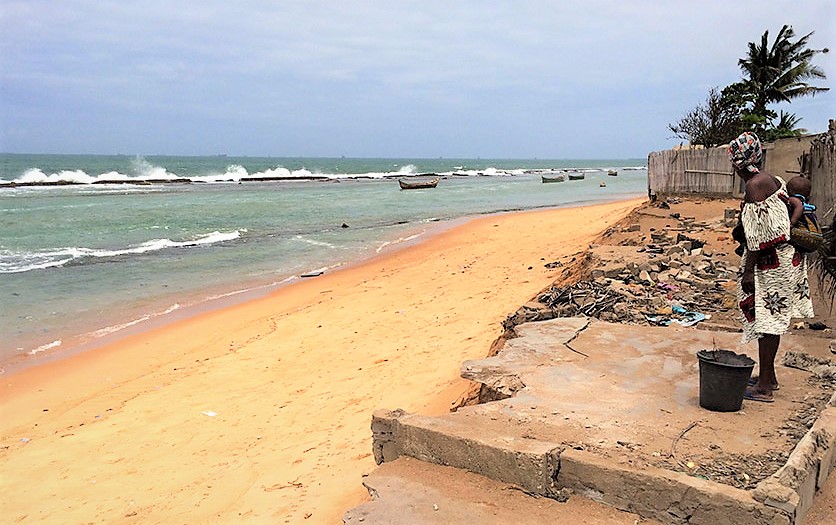News | Abidjan, Côte d’Ivoire
Breaking Down Barriers to Private Sector Investment to Build Resilience for West Africa’s Coasts
The celebration of Earth Day this week should cause us to consider the state of our planet.
The celebration of Earth Day this week should cause us to pause and consider the state of our planet. What weighs heavily on our minds is the degradation of West Africa’s coasts; they are literally being washed away by coastal erosion and flooding—and, with them, crucial infrastructure and livelihoods are lost. The scale of the damage and the financing needs call for contributions from all key actors, including the private sector.Which is why we recently brought the public and private sectors together through the World Bank’s West Africa Coastal Areas Management Program (WACA) to discuss how they can collaborate to fight coastal degradation, increase coastal resilience to climate change, and improve the livelihoods of coastal communities. Developing public-private partnerships (PPPs) was one of the many concrete examples that surfaced.
West Africa’s coastal areas host about one-third of the region’s population and generate 56 percent of its GDP. Economic, demographic, and urban growth has led to significant infrastructure development along the coast. This comes with issues of land use and waste management that can result in reduced tourism opportunities, fish contamination, depletion of fish stocks, loss of land and infrastructure, marine and groundwater pollution, and sometimes human deaths.
A new World Bank study estimates that environmental degradation in the coastal areas of Benin, Côte d’Ivoire, Senegal, and Togo cost $3.8 billion, or 5.3 percent of the four countries’ GDP in 2017.
Although considered a non-traditional actor in the financing of Integrated Coastal Zone Management (ICZM), the private sector with its built infrastructure occupies a significant geographical footprint in coastal areas. As such, its activities can often negatively impact coastal systems. At the same time, their activities are also negatively impacted by natural hazards like coastal erosion, coastal flooding, as well as by climate change.
The public-private sector dialogue, funded by the NDC Support Facility, the Nordic Development Fund (NDF), and the Global Facility for Disaster Reduction and Recovery (GFDRR) was organized by WACA’s $222 million Resilience Investment Project. This effort is led by West African governments and funded by the World Bank, NDF, the Global Environment Facility (GEF), and other partners to help protect West African coasts and build resilient coastal communities. Besides this first regional investment project, WACA includes a platform through which it intends to scale up financing to $2 billion by crowding-in technical and financial partners.
The event, held in Côte d’Ivoire, was an opportunity to invite private and public players to discuss the current state of coastal areas in West Africa and to identify the key barriers to the private sector’s engagement in the sustainable management of coastal zones.
Participants were challenged to propose potential solutions to break those barriers and allow the private sector to play a more significant role in building the resilience of coastal areas in West Africa. This role and increased contribution of the private sector to ICZM activities and initiatives would not be limited to financing, but also advocacy, education, and community building.
One important result of the dialogue was the creation of a private sector consultative group that includes CEOs and professionals from companies in the tourism, ports, mining, oil and gas, fisheries, agribusiness, and transport sectors. The group will provide a dedicated space to continue discussing their role in ICZM and to explore, together with WACA and other technical partners, the types of market and non-market mechanisms that could facilitate private sector financing of coastal protection infrastructure and other coastal resilience building activities.
As an example, our discussions confirmed the need to develop PPPs and provide fiscal and economic incentives to companies that respect key regulations and/or desire to implement coastal protection based on rigorous technical analysis and feasibility studies as well as robust environmental and social impact assessment.
This first private sector dialogue for WACA also put a spotlight on ports and port operators in West Africa who recognized the need to establish a working group for their sub-sector to assess the adverse impacts of their activities on the marine and coastal environments and to commit together to more sustainable practices. They have already started working on a sustainable ports charter.
As the public and private sectors get together, the next challenge will be to maintain this dialogue, involve more players, and start the design of market and non-market mechanisms to allow financial flows from the private sector into ICZM. There is no time to waste; saving West Africa’s coastline and people’s livelihoods depends on it.
Submitted by Elikia Kamga Nenkam On Thu, 04/25/2019
co-authors: Melissa Landesz
